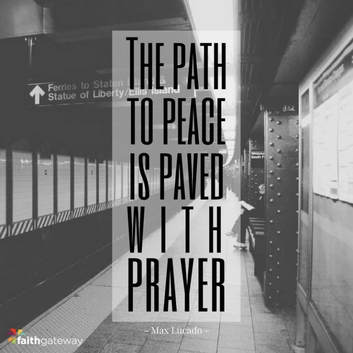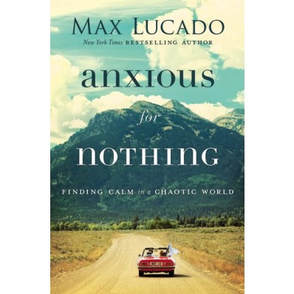
Matthew 6:11-13 (NKJV) Give us this day our daily bread.
That’s a specific request. To his first followers, bread was central to life. It was a staple. A necessity. So Jesus said, “Pray for bread.”
Here’s a specific request made to Jesus.
Luke 18:35-43 (NLT)35 As Jesus approached Jericho, a blind beggar was sitting beside the road.36 When he heard the noise of a crowd going past, he asked what was happening.37 They told him that Jesus the Nazarene was going by.38 So he began shouting, “Jesus, Son of David, have mercy on me!”39 “Be quiet!” the people in front yelled at him. But he only shouted louder, “Son of David, have mercy on me!”40 When Jesus heard him, he stopped and ordered that the man be brought to him. As the man came near, Jesus asked him,41 “What do you want me to do for you?” “Lord,” he said, “I want to see!”42 And Jesus said, “All right, receive your sight! Your faith has healed you.”43 Instantly the man could see, and he followed Jesus, praising God. And all who saw it praised God, too.
Here the blind man, Bartimaeus was asking for mercy. That’s great and important, but it’s a very general request. Jesus could have had somebody give him some money, or food or any number of things which would have been acts of mercy. However Jesus asked him what he wanted specifically. He asked him “what do you want me to do for you”. Then Bartimaeus got specific. “I want to see”
Here is a specific request made by three times by Jesus.
Matthew 26:36-44 (NKJV)36 Then Jesus came with them to a place called Gethsemane, and said to the disciples, "Sit here while I go and pray over there."37 And He took with Him Peter and the two sons of Zebedee, and He began to be sorrowful and deeply distressed.38 Then He said to them, "My soul is exceedingly sorrowful, even to death. Stay here and watch with Me."39 He went a little farther and fell on His face, and prayed, saying, "O My Father, if it is possible, let this cup pass from Me; nevertheless, not as I will, but as You will."40 Then He came to the disciples and found them asleep, and said to Peter, "What? Could you not watch with Me one hour?41 Watch and pray, lest you enter into temptation. The spirit indeed is willing, but the flesh is weak."42 Again, a second time, He went away and prayed, saying, "O My Father, if this cup cannot pass away from Me unless I drink it, Your will be done."43 And He came and found them asleep again, for their eyes were heavy.44 So He left them, went away again, and prayed the third time, saying the same words. (Bold mine)
When we get specific in prayer we get all the other clutter out so that we can spell out and spill out what it is we really want to ask.
Being specific in prayer has several advantages. In “Prayer, Not Despair”, an excerpt, from his book Anxious for Nothing, Max Lucado points out three benefits of being specific in prayer. To get a copy of the book click any of the Anxious for Nothing links or the image of the book after the blog post.
by Max Lucado from Anxious for Nothing
Peace happens when people pray.
I like the story of the father who was teaching his three-year-old daughter the Lord’s Prayer. She would repeat the lines after him. Finally she decided to go solo. He listened with pride as she carefully enunciated each word, right up to the end of the prayer. “Lead us not into temptation,” she prayed, “but deliver us from e-mail.”
These days that seems like an appropriate request. God calls us to pray about everything. The terms prayer, supplication, and requests are similar but not identical. Prayer is a general devotion; the word includes worship and adoration. Supplication suggests humility. We are the supplicants in the sense that we make no demands; we simply offer humble requests. A request is exactly that — a specific petition. We tell God exactly what we want. We pray the particulars of our problems.
What Jesus said to the blind man, he says to us:
What do you want Me to do for you? — Luke 18:41 NIV
One would think the answer would be obvious. When a sightless man requests Jesus’ help, isn’t it apparent what he needs? Yet Jesus wanted to hear the man articulate his specific requests.
He wants the same from us. “Let your requests be made known to God.” When the wedding ran low on wine, Mary wasn’t content to say, “Help us, Jesus.” She was specific:
They have no more wine. — John 2:3 NIV
The needy man in Jesus’ parable requested,
Friend, lend me three loaves. — Luke 11:5 NIV
Not just “Give me something to eat” or “Can you help me out?” He made a specific request. Even Jesus in the Garden of Gethsemane prayed specifically,
Take this cup from Me. — Luke 22:42 NIV
Why does this matter? I can think of three reasons.
- A specific prayer is a serious prayer. If I say to you, “Do you mind if I come by your house sometime?” you may not take me seriously. But suppose I say, “Can I come over this Friday night? I have a problem at work, and I really need your advice. I can be there at seven, and I promise I will leave by eight.” Then you know my petition is sincere. When we offer specific requests, God knows the same.
- Specific prayer is an opportunity for us to see God at work. When we see Him respond in specific ways to specific requests, our faith grows. The book of Genesis relates the wonderful prayer of Abraham’s servant. He was sent to Mesopotamia, Abraham’s homeland, to find a wife for Abraham’s son. How does a servant select a wife for someone else? This servant prayed about it.
“O Lord, God of my master, Abraham,” he prayed. “Please give me success today, and show unfailing love to my master, Abraham. See, I am standing here beside this spring, and the young women of the town are coming out to draw water. This is my request. I will ask one of them, ‘Please give me a drink from your jug.’ If she says, ‘Yes, have a drink, and I will water your camels, too!’—let her be the one you have selected as Isaac’s wife. is how I will know that you have shown unfailing love to my master.” — Genesis 24:12–14 NLT
Could the servant have been more detailed? He asked for success in his endeavor. He envisioned an exact dialogue, and then he stepped forth in faith. Scripture says,
Before he had finished speaking, Rebekah appeared. — Genesis 24:15 ISV
She said the words. The servant had an answered prayer. He saw God at work.
- Specific prayer creates a lighter load. Many of our anxieties are threatening because they are ill defined and vague. If we can distill the challenge into a phrase, we bring it down to size. It is one thing to pray, Lord, please bless my meeting tomorrow. It is another thing to pray, Lord, I have a conference with my supervisor at 2:00 p.m. tomorrow. She intimidates me. Would you please grant me a spirit of peace so I can sleep well tonight? Grant me wisdom so I can enter the meeting prepared. And would You soften her heart toward me and give her a generous spirit? Help us have a gracious conversation in which both of us benefit and Your name is honored. There. You have reduced the problem into a prayer-sized challenge.
This is no endorsement of the demanding, conditional prayer that presumes to tell God what to do and when. Nor do I suggest that the power of prayer resides in chanting the right formula or quoting some secret code. Do not think for a moment that the power of prayer resides in the way we present it. God is not manipulated or impressed by our formulas or eloquence. But He is moved by the sincere request. After all, is He not our Father? As His children we honor Him when we tell him exactly what we need.
On my good days I begin my morning with a cup of coffee and a conversation with God. I look ahead into the day and make my requests. I am meeting with so-and-so at 10:00 a.m. Would You give me wisdom? This afternoon I need to finish my sermon. Would You please go ahead of me? Then if a sense of stress surfaces during the day, I remind myself, Oh, I gave this challenge to God earlier today. He has already taken responsibility for the situation. I can be grateful, not fretful.
Cast all your anxiety on Him because He cares for you. — 1 Peter 5:7 NIV
Casting is an intentional act to relocate an object. When the disciples prepared Jesus to ride into Jerusalem on Palm Sunday, they “cast their garments upon the colt” (Luke 19:35 KJV). The crowd removed the garments off their backs and spread them in the path of Christ. Let this “throwing” be your first response to bad news. As you sense anxiety welling up inside you, cast it in the direction of Christ. Do so specifically and immediately.
I did a good job of “casting my problems” in a high school algebra class. My brain scans reveal a missing region marked by the sign “Intended for Algebra.” I can remember sitting in the class and staring at the textbook as if it were a novel written in Mandarin Chinese.
Fortunately I had a wonderful, patient teacher. He issued this invitation and stuck to it. “If you cannot solve a problem, come to me and I will help you.” I wore a trail into the floor between his desk and mine. Each time I had a question, I would approach his desk and remind him, “Remember how you promised you would help?” When he said yes, instant gratitude and relief kicked in. I still had the problem, mind you, but I had entrusted the problem to one who knew how to solve it.
Do the same. Take your problem to Christ and tell Him, “You said you would help me. Would You?”
The path to peace is paved with prayer.
Less consternation, more supplication. Fewer anxious thoughts, more prayer-filled thoughts. As you pray, the peace of God will guard your heart and mind. And, in the end, what could be better?
Excerpted with permission from Anxious for Nothing by Max Lucado, copyright Max Lucado.


 RSS Feed
RSS Feed